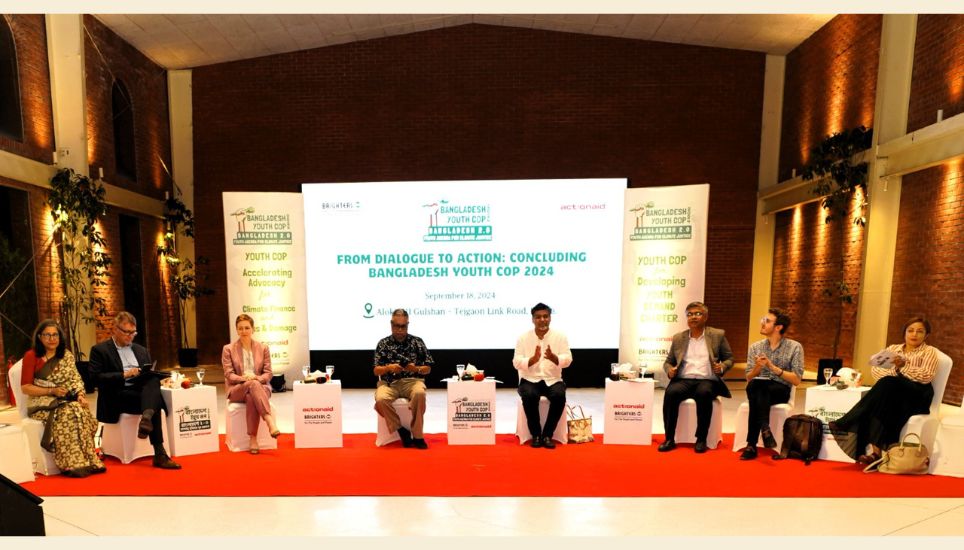Home ›› Environment

Over 200 young climate activists from across the country have issued 14 demands to ensure climate justice in a Bangladesh 2.0.
These demands aim to amplify the voices of young people at the grassroots level and ensure their participation in national and international policymaking processes to address climate crisis, read a press release.
At the closing ceremony of the three-day Bangladesh Youth CoP 2024 conference, jointly organized by ActionAid Bangladesh and the Brighters Youth Society at Aloki Convention Centre in the capital today Wednesday, the youth presented their manifesto.
The conference, held in hybrid format, brought together over 200 young representatives who discussed pressing climate issues such as safe drinking water shortages, wetland crises, and the hardships faced by drought and flood-affected areas.
They also exchanged views with experts on these matters.
The conference emphasized the importance of implementing climate justice through youth-led initiatives and a green economy.
Key discussions focused on renewable energy, addressing the losses and damages caused by climate change, and prioritising the impacts on marginalized communities, especially women and adolescents.
Prior to the conference, a series of consultations were conducted with youths from grassroots areas, including Satkhira, Cox's Bazar, Kurigram, Sunamganj and Bandarban, to gather their opinions on climate change.
Additionally, various sessions during the three-day conference addressed youth-led disaster management, climate finance, a feminist perspective on climate justice, the role of the media in addressing climate change, and climate-related policies.
National and international climate experts participated in these discussions.
The discussions highlighted the need for effective policies and initiatives at all levels to tackle the impacts of climate change and establish climate justice in Bangladesh.
Speakers called upon the government and relevant institutions to enhance youth capacity and take youth-led initiatives to address climate change, stressing the importance of allocating funds for these initiatives.
In the closing session, ActionAid Bangladesh Country Director Farah Kabir emphasized the need to create opportunities for youth to lead initiatives on climate justice and ensure that their demands reach national policymakers and decision-makers at CoP-29 in Azerbaijan.
She said, “Young people are taking initiative to achieve climate justice in new Bangladesh; we must create spaces and scopes for them. I believe the Bangladesh Youth CoP will be able to get attention from the national and international policymakers.”
Young climate activist Jannatul Naeem said, “People in the most marginalized areas of Bangladesh are suffering the most from this global climate crisis.
“We have heard about the struggles of around 800 climate activists in these marginalised areas over the past month. Through these 14 demands, we want to influence policy discussions at both the national and international levels.”
A climate expert Dr Ainun Nishat stated, “The climate crisis is not an isolated issue. Our country has laws in place. We need to assess the extent to which solutions to each problem can be implemented at the local level.
“Youth should lead local-level disaster and water management initiatives. Moreover, the parameters of climate change adaptation must be gender-sensitive and youth-oriented.”
Acting High Commissioner of Australia Nardia Simpson underscored the need for sustained advocacy in the fight against climate change, saying, “We need to consistently raise our voices to address the climate crisis.
“At the same time, young people must unite and collectively raise awareness about climate issues. We must repeatedly communicate to those who deny the climate crisis through policy advocacy. We need to take this effort to a larger scale.”
Emphasising the importance of inclusive participation in addressing the climate crisis, Deputy Head of Mission at the Danish Embassy Anders B Karlsen said, “The climate crisis is a global and mainstream issue. We must listen to the demands of young people to address this crisis.
“The voices of young people must be elevated both locally and globally to ensure climate justice.”

Head of the Economic Department at the French Embassy in Bangladesh DEUR Julien highlighted the power of collective action in addressing climate challenges, “When people come together to solve a problem, solutions emerge. We must all work together.
“In the pursuit of climate justice, we must give space to young leadership alongside government efforts.”
First Secretary at the Swedish Embassy Nayoka Martinez stated, “Young people are the architects of the future. They have opened new doors of possibilities for a new Bangladesh. Their strong voices have created an environment of accountability at all levels of society. Young people can teach everyone how to ensure climate justice. They can unite everyone towards a common goal.”
Among those present at the closing session were Korvi Rakhshand, Founder of Jaago Foundation; Arif M Faisal, Programme Specialist at UNDP Bangladesh; Mozammel Haque, Senior Climate Analyst at BRAC; Ariful Islam Adib, and Monira Sharmin, members of jatiya nagorik committee; among others. Additionally, distinguished officials from various embassies, government and non-governmental development organisations, academia, and the media, along with over 200 young climate activists, were in attendance.
Youth’s demands for climate justice